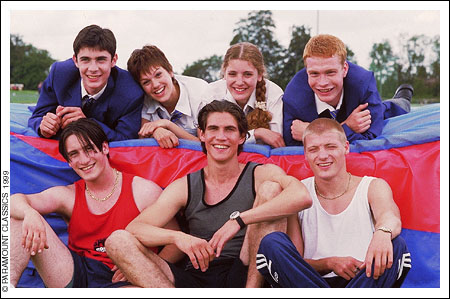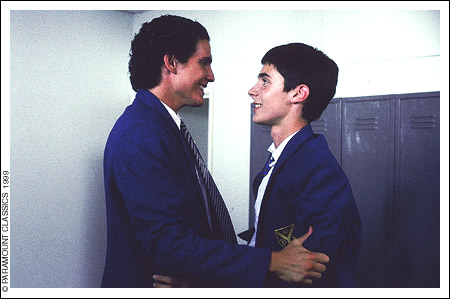![[safe]](safe.gif)

Get Real

Starring Ben Silverstone, Brad Gorton, Charlotte Brittain, Stacey Hart
Directed by Simon Shore
![[safe]](safe.gif)


In this climate of teen-centric movies, it is no wonder that Paramount is launching its Classics division with this UK import about teenagers in love. Much feted at festivals, "Get Real" is the sort of charming, small feature that finds a ready audience in specialized markets here.
Written for the screen and based on the play "What's Wrong with Angry?" by Patrick Wilde, "Get Real" will probably remind astute viewers of recent UK imports like "Beautiful Thing" and "Like It Is". All these films handle the subject of teenagers coming to terms with their homosexuality in a sensitive, humorous way, and all were moderately successful in their home country. Unlike the earlier two films, however, "Get Real" is set in the upper middle class income bracket of British society, so the kinds of issues brought up and the way characters handle their conflicted emotions is far different.
 Whereas the teenagers in "Beautiful Thing" and "Like It Is" had to battle their burgeoning desires amidst a social climate that is closed to gay behavior, Steven (Ben Silverstone) is a preppie in a posh private school in the suburbs of New Hampshire, and although his sexual orientation is no less shocking and unacceptable, the code of conduct amongst the upper class makes it so much easier for him to be at ease with himself and his inclinations. At the start of the film, Steven is lusting after the school jock, John (Brad Gorton), and trying to find the inspiration to write truthfully about his life experience for a newspaper competition his parents are pressuring him to enter. His neighbor Linda (Charlotte Brittain) is the only one who knows about his sexual preference and the pair trade stories about their unrequited loves and frustrations. During an anonymous bathroom encounter, Steven inadvertently discovers that John is experimenting with the gay lifestyle, and soon, the pair form a secret alliance and slowly fall in love. Fearful of uppercrust disapproval, however, John insists that their relationship must remain secret, and when Jessica (Stacey Hart) guesses the truth behind the pair, things between them become strained and painful. It all comes to a head during graduation, when choices between loving and lying have to be made, and the teenagers have to take a stand for what they believe in.
Whereas the teenagers in "Beautiful Thing" and "Like It Is" had to battle their burgeoning desires amidst a social climate that is closed to gay behavior, Steven (Ben Silverstone) is a preppie in a posh private school in the suburbs of New Hampshire, and although his sexual orientation is no less shocking and unacceptable, the code of conduct amongst the upper class makes it so much easier for him to be at ease with himself and his inclinations. At the start of the film, Steven is lusting after the school jock, John (Brad Gorton), and trying to find the inspiration to write truthfully about his life experience for a newspaper competition his parents are pressuring him to enter. His neighbor Linda (Charlotte Brittain) is the only one who knows about his sexual preference and the pair trade stories about their unrequited loves and frustrations. During an anonymous bathroom encounter, Steven inadvertently discovers that John is experimenting with the gay lifestyle, and soon, the pair form a secret alliance and slowly fall in love. Fearful of uppercrust disapproval, however, John insists that their relationship must remain secret, and when Jessica (Stacey Hart) guesses the truth behind the pair, things between them become strained and painful. It all comes to a head during graduation, when choices between loving and lying have to be made, and the teenagers have to take a stand for what they believe in.
Wilde's script is a keenly observed piece of work. None of the conversations sound forced nor unreal, and a number of speeches are written so as to sound awkward and genuine, as opposed to polished and fake. The scenes where Steven and John attempt to explain how they feel for each other, and when they attempt to figure out a future for themselves, sound immature and funny - as they should, since these are the sentiments of teens on the cusp of adulthood who do not yet fully understand the strength of their feelings. The script's weak moments are in the stock characters created - the supportive mother, the glamorous girlfriend, the gay-bshing jocks, the overweight fag hag best friend; for once, it would be nice to see a movie without the usual stereotypes being trotted out to do their bit.
 That said, Charlotte Brittain, who plays the last mentioned stereotype, does a marvellous job in enlivening matters. A source of subtle comic relief and genuine emotion, Brittain imbues her character with the kind of mischievious sincerity that make her believable and likable. Both Ben Silverstone and Brad Gorton perform admirably well in their respective roles. Gorton, with the slightly more difficult of the two parts, occasionally falters, relying on tics to convey angst, but by and large, both actors manage to create memorable protagonists that the audience will root for. The best performance in the film is actually given by Stacey Hart, who plays the girl who is at first infatuated with Steven, then later becomes his ally and friend. Bringing a certain movie star luminescence to the screen, Hart easily conveys the girlish youth of her character, presenting a fully realized portrait of a young woman in the making.
That said, Charlotte Brittain, who plays the last mentioned stereotype, does a marvellous job in enlivening matters. A source of subtle comic relief and genuine emotion, Brittain imbues her character with the kind of mischievious sincerity that make her believable and likable. Both Ben Silverstone and Brad Gorton perform admirably well in their respective roles. Gorton, with the slightly more difficult of the two parts, occasionally falters, relying on tics to convey angst, but by and large, both actors manage to create memorable protagonists that the audience will root for. The best performance in the film is actually given by Stacey Hart, who plays the girl who is at first infatuated with Steven, then later becomes his ally and friend. Bringing a certain movie star luminescence to the screen, Hart easily conveys the girlish youth of her character, presenting a fully realized portrait of a young woman in the making.
Director Simon Shore works hard to maintain a constant flow with his film, but he sometimes fails to do so - some scenes lack an air of urgent tension, causing the audience to listen without hearing what the actors are saying, and others feel overlong, diffuse and cause the audience's minds to wander. These are small problems in a film that gets most of it right, but they also highlight how important it is for material of this sort to be handled just right.

Perhaps what is most curious is Paramount's decision to use this film as a springboard for its "indie" arm. The film is entertaining, thoughtfully made and worth watching, but hardly seems like groundbreaking fare that will elicit the kind of response a new company would try to engender to announce its arrival. The ad campaign so far has been amusing and restrained - classy, if you will - but doesn't really play to the audience this film is targetting. Slight, interesting and well acted, "Get Real" might have stood a better chance of box office success if it had instead been picked up by a smaller outfit dedicated to niche marketing, one that would have aggressively pursued a majority of the smaller market. As it is, Paramount Classics seems to be half-heartedly enticing studio-friendly audiences and the art-house crowd - it seems unlikely that they will win either in enough numbers to enable this film to be fully appreciated. Pity.